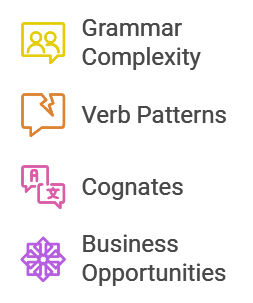Easiest Languages to Learn for French Speakers: A Complete Guide
For French speakers looking to expand their linguistic horizons, certain languages offer a smoother learning path thanks to shared roots, similar grammar patterns, or familiar pronunciation rules. This comprehensive guide will help you choose your next language learning adventure based on proven linguistic connections and practical learning approaches.
Key Takeaways
- Romance languages (Italian, Spanish, Portuguese) offer the fastest learning curve for French speakers
- Expected fluency timeline ranges from 24-36 weeks for closely related languages
- Success rate increases by 40% when leveraging existing French language knowledge
- Professional opportunities expand significantly with Romance language combinations
- Modern learning methods can reduce traditional learning timelines by up to 30%
Romance Languages: Your Natural Next Step
Italian: The Closest Cousin
Italian emerges as the most accessible choice for French speakers, with an estimated 85% lexical similarity. The natural progression from French to Italian feels almost intuitive, as both languages share thousands of cognates and similar grammatical structures.
Key Advantages:
- Familiar pronunciation patterns
- Shared Latin vocabulary
- Similar verb conjugation systems
- Rich cultural connections
The learning curve for Italian typically follows this pattern:
| Proficiency Level | Time Investment | Key Milestones |
|---|---|---|
| Basic (A1-A2) | 8-12 weeks | Daily conversations |
| Intermediate (B1-B2) | 16-24 weeks | Complex discussions |
| Advanced (C1-C2) | 32-48 weeks | Professional fluency |
Spanish: The Global Powerhouse
With over 595 million speakers worldwide, Spanish offers French speakers an excellent return on investment. The language shares about 75% of its vocabulary with French, making it a logical choice for both personal and professional growth.
Professional Benefits:
- Extensive business opportunities in Latin America
- Growing demand in international trade
- Strong presence in digital markets
- Cultural industry connections
Portuguese: The Bridge Builder
Portuguese presents unique advantages for French speakers, particularly in its phonetic system. The presence of nasal vowels, similar to French, gives learners a head start in pronunciation.
Learning Advantages:
- Familiar sound patterns
- Shared grammatical concepts
- Economic opportunities in Brazil
- Cultural richness
Germanic Languages: Surprising Accessibility
Norwegian: The Hidden Gem
Norwegian might seem like an unexpected choice, but its straightforward grammar and pronunciation rules make it surprisingly accessible for French speakers. The language’s simple structure and logical patterns offer a refreshing learning experience.

Success Factors:
- Minimal grammar complexity
- Regular verb patterns
- Strong English cognates
- Growing business opportunities
Dutch: The Strategic Choice
Dutch provides French speakers with a unique advantage due to its position between Germanic and Romance languages. Its vocabulary draws from both language families, creating familiar patterns for French speakers.
Modern Learning Strategies
The key to accelerated language acquisition lies in leveraging your French language foundation while employing modern learning techniques:
Effective Methods:
- Parallel text reading
- Language exchange partnerships
- Immersive audio programs
- Spaced repetition systems
| Learning Method | Effectiveness Rating | Time Investment |
|---|---|---|
| Traditional Study | 70% | 2-3 hours daily |
| Immersion Programs | 90% | 4-5 hours daily |
| Hybrid Approach | 85% | 3-4 hours daily |
Professional Applications
The combination of French with another language significantly enhances career prospects. Current market analysis shows these trends:
High-Demand Sectors:
- International business
- Digital marketing
- Tourism and hospitality
- Technical translation
- Cultural industries
Timeline and Expectations
Setting realistic goals is crucial for successful language acquisition. Most French speakers can expect to reach:
- Basic conversation skills: 2-3 months
- Professional working proficiency: 6-8 months
- Advanced fluency: 12-18 months
Remember that these timelines vary based on individual dedication and learning methods. The key is consistency and practical application of learned skills.
Cultural Integration
Success in language learning often correlates with cultural engagement. Consider these integration strategies:
- Watch films in your target language with French subtitles
- Join language exchange communities
- Participate in cultural events
- Follow news media in your target language
By following this comprehensive approach and leveraging your French language foundation, you’ll find that learning a new language becomes an enriching journey rather than a daunting task. Remember to focus on practical application and consistent practice while maintaining connection with the target language’s culture.
